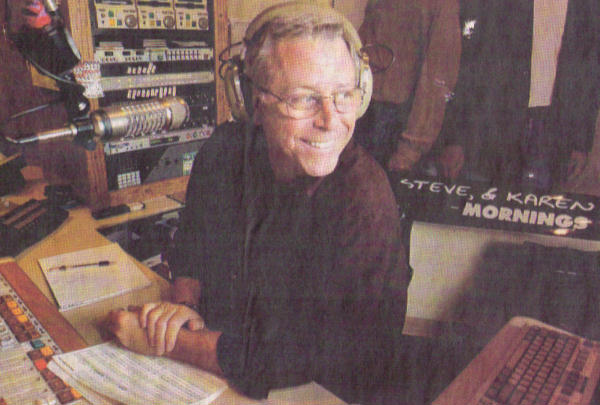|

"I could have gone more places for
more money, but in the end what would the result be but more
money?" says Tom Prestigiacomo of his 25-year run as afternoon drive-time
deejay at FM 100.
Long Player
Deejay Tom Prestigiacomo shows
staying
power in an often-turbulent profession
By Tom Walter
Twenty-five years is a long time
for someone to work anywhere. But at a radio station in one of the
most volatile professions there is? And on the same shift for all 25
years?
Radio people could their tenure
in dog years: 25 years to a disc jockey is like 165 in human years.
Well, it might not be that dramatic,
but when Tom Prestigiacomo celebrates 25 years on the air on FM 100
this Friday, it's worthy of note.
Prestigiacomo owes his job, indirectly, to another FM 100 veteran.
Ron Olson left FM 100 in 1978 and Tom Prestigiacomo came to fill his
afternoon drive-time shift when another jock didn't work out.
Se he was once removed from Olson (who returned to FM 100 in 1983 to
stay) and, once he took over the afternoon drive-time shift, hasn't
budged or been nudged since.
"It's not common at all. It's just amazing. I personally have never
known anybody who to do this," said FM 100 general manager Terry
Wood. "It's not unusual to be on a station for a longer period of
time, but to be in one place as an on-air talent in the same shift,
I've never heard of it before, although I'm sure it happens. There
are legendary morning show personalities in places, but those are
really, really rare."
They are rare because talented personalities in markets the size of
Memphis (the 48th largest radio market) tend to go to larger cities
to pursue fame and fortune.
Don't tell Prestigiacomo that.
"I could have gone more places for more money, but in the end what
would the result be but more money?" he asked.
That's one of the reasons the Louisville native stayed. His two
children were born here. His late wife, a native Memphian, taught
school here. He loves the city. He appreciates the support he got
from the station when his wife became ill from cancer.
He has lots of reasons to stay, but why did the radio audience stay?
"When you hear Tom on FM 100 and you meet Tom in person, he's the
same guy. He's as real as they come, as natural as a redwood tree in
California," said Danny Ocean, the station's program director (the
11th Prestigiacomo has seen) who's been on the job here less than a
month.
One of the things program directors do, though, is listen hard when
their talent is on the air.
"Certain people emote different things," Ocean said. "He emotes
genuine, natural."
Prestigiacomo, 52, said it's been an advantage to grow older with
his audience.
"We're the first generation of jocks who actually grew up with their
audience," he said. "We at FM 100 have always appealed to our target
(which in radio tens to be the 25-54 demographic), and so the things
you talk about are completely different" than they were 25 years
ago, he said. "It's welcome home teachers, hello to car pool moms.
The focus changes from where to go out tonight to what's on TV."
What's even more remarkable is that Prestigiacomo - along with
morning deejays Ron Jordan and Steve Conley - survived the
vicissitudes of the radio biz, where stations sometimes change
formats as often as the rest of us change socks. FM 100 has tweaked
its format over the years, but has remained essentially an adult
contemporary station.
"It's popular music for people with three-digit IQs," he said.
"We're family-oriented. That's what we've always been."
"It's not easy getting people interested in listening to you day
after day. It takes a certain enthusiasm, which Prestigiacomo still
has.
"My energy level is the same because I wake up every morning and I
think 'I get to go to work,' not 'I have to go to work," he said.
 |